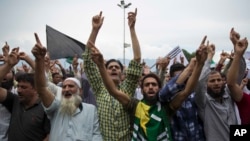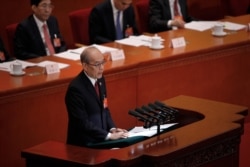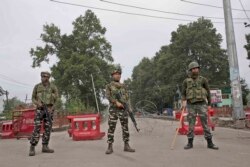Updated at 5:38 p.m. Aug. 16.
UNITED NATIONS - The U.N. Security Council met privately Friday to discuss India's Aug. 5 decision to revoke the special status of Jammu and Kashmir, which has led to a security crackdown in the territory and an escalation in tensions with neighboring Pakistan.
Permanent council member China requested the session on behalf of Pakistan, which had sent three letters to the council's president detailing its concerns since early August. It is the first time the council has met on the issue since 1971.
"It's obvious that the constitutional amendment by India has changed the status quo in Kashmir, causing tensions in the region," China's new U.N. envoy, Zhang Jun, told reporters, referring to India's decision to revoke Article 370 of its constitution, which gave the Muslim-majority territory semiautonomy.
Zhang noted Beijing's deep concern and called on the parties to exercise restraint.
Meanwhile, Pakistan Prime Minister Imran Khan discussed the situation in Jammu and Kashmir over the phone Friday with U.S. President Donald Trump. Khan and Trump met in Washington last month.
According to a White House statement, Trump conveyed the importance of India and Pakistan reducing tensions on this issue through bilateral dialogue.
Overlapping claims
The Kashmir region is divided among India, Pakistan and China, who have overlapping territorial claims. In Indian-controlled Kashmir, China controls an area in the east known as Aksai Chin, and Zhang said India had challenged China's "sovereign interests" there and violated a bilateral agreement related to peace in the border area.
"And on that, China is also very much seriously concerned," Zhang said. "And we wish to emphasize that such unilateral practice by India is not valid in relation to China and will not change China's exercise of sovereignty and effective administrative jurisdiction over the territory."
Kashmir has been a regional flashpoint for decades. Nuclear powers India and Pakistan have fought several wars over Kashmir since they both gained independence from Britain in 1947.
India views the issue as an internal matter to be handled bilaterally with Pakistan, but Pakistan's ambassador argued that was not the case.
"The fact that this meeting took place is testimony to the fact that this is an internationally-recognized dispute," Ambassador Maleeha Lodhi told reporters. "Today the whole world is discussing the occupied state and the situation there."
She said Pakistan stood ready for a peaceful settlement of the dispute.
Since the revocation of Article 370, India has effectively cut off Kashmir’s communications with the rest of the world, imposing a blackout on telephones and the internet, stepping up security and limiting free movement.
'Reasonable restrictions'
"Public order is integral to ensuring that democracy prospers," Indian U.N. envoy Syed Akbaruddin said in response to reporters' questions. "There are reasonable restrictions. We acknowledge that these are restrictions. We are easing them."
He said it would be up to the administrators on the ground to decide how quickly they would be eased or ended. But he said they were necessary to prevent "terrorists" from acting against the people.
In February, a young Kashmiri suicide bomber attacked a military convoy, killing more than 40 Indian troops. India blamed Pakistan for the attack and retaliated with airstrikes on what it said was a terrorist camp in Pakistan.
Of the possibility of talks with Pakistan, Akbaruddin said it would be necessary for Pakistan to "stop terror to start talks."
Between 1948 and 1971, the Security Council has adopted 18 resolutions on the situation. The U.N. has a very small military observer force in the area to monitor the cease-fire. The territorial dispute remains the primary source of regional tensions.






